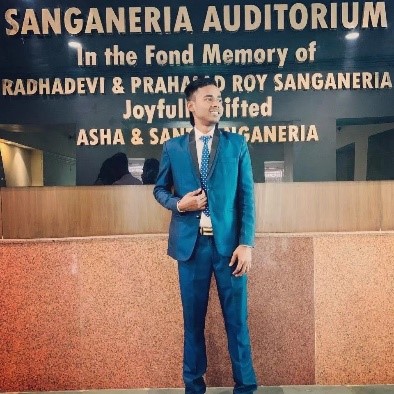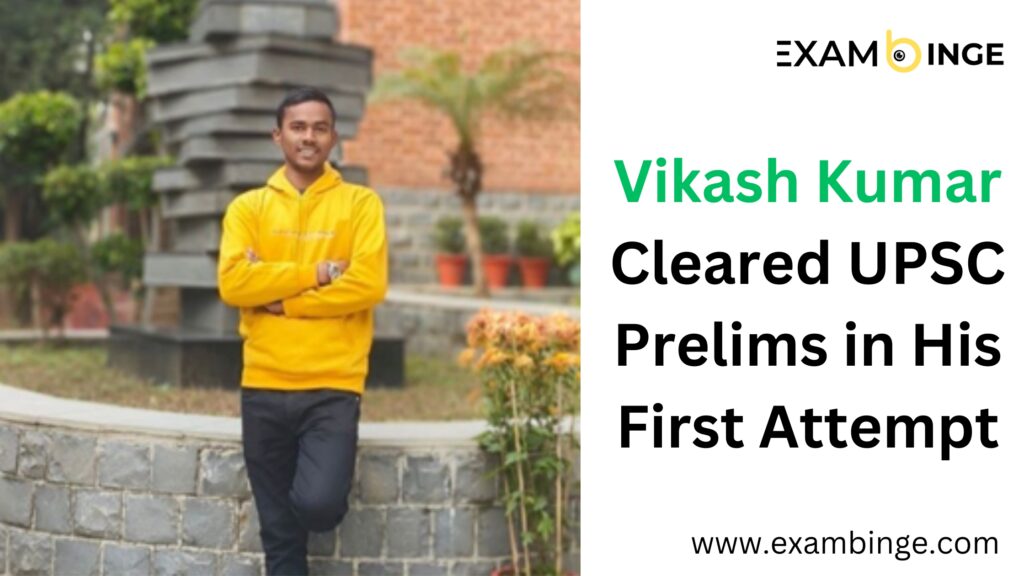Introduction and educational background
Vikash Kumar, a determined son of Ashish Prasad from Bihar, has always dreamed of becoming an Indian Administrative Service (IAS) officer since his childhood age. His academic journey began in 2013 at Jawahar Navodaya Vidyalaya (JNV), Nawada, where he excelled and was the class topper until Class 10. In 2018, he achieved the remarkable feat of being the school topper in the CBSE Class 10 exams. Vikash continued his education in the science stream (PCB) for Class 12, staying focused on his academic goals.
In 2020, Vikash joined Hindu College (Delhi University) India’s no 1 college in science stream, to pursue his undergraduate degree. During his final year, he began preparing for the UPSC exam while managing his academic workload. After graduating in 2023, he devoted himself entirely to UPSC preparation.
At Hindu College, Vikash actively participated in extracurricular activities, particularly through the National Service Scheme (NSS), and completed internships with various NGOs. These experiences not only enriched his college life but also shaped his understanding of social issues, leadership, and community service—skills that were invaluable for his UPSC preparation and ahead.
This blog recounts how Vikash Kumar cleared UPSC Prelims in his first attempt in 2024 without any coaching, demonstrating the power of determination, smart strategy, and self-study. His story aims to inspire other aspirants to believe in their capabilities and pursue their dreams relentlessly..
Why he decided to prepare for UPSC?
Vikash Kumar’s decision to prepare for UPSC stemmed from a lifelong dream of becoming an IAS officer and making a meaningful impact on society. Growing up in Bihar, he was inspired by the transformative role of civil servants in improving lives and bringing change.
His fascination with the diverse subjects of the UPSC syllabus and a passion for public service fueled his commitment. Driven by the desire to be a part of India’s administrative machinery, he dedicated himself wholeheartedly to this journey, viewing it as a pathway to nation-building and social empowerment.
Why he chose to prepare without coaching?
Vikash Kumar chose to prepare for UPSC without coaching because he believed in the power of self-discipline, strategic planning, and focused study. He was confident that with the right resources, determination, and a personalized approach, success could be achieved independently.
The flexibility of self-study allowed him to tailor his preparation to his strengths and weaknesses while saving time and money. Inspired by stories of other self-taught toppers and driven by a strong sense of self-reliance, Vikash embraced the challenge to prove that consistent effort, smart work, and perseverance can triumph over conventional methods.
Strategy of Vikash kumar for UPSC Prelims
Vikash Kumar’s strategy for UPSC preparation was centred around self-discipline, focused study, and effective time management. He broke down the vast syllabus into manageable sections, prioritizing topics based on their importance and overlap across different subjects. His preparation involved:
- Source Mapping of PYQs: A key part of his strategy was source mapping, where he meticulously identified and stuck to a limited set of reliable resources
- Comprehensive Reading: Vikash relied on standard reference books and NCERTs to build a strong foundation, ensuring he grasped fundamental concepts before diving into advanced material.
- Smart Time Management: He created a flexible timetable, ensuring regular revisions and maintaining a balance between different subjects. This helped him stay consistent and avoid burnout.
- Current Affairs Focus: Keeping up with current affairs was a key aspect of his strategy. He regularly read newspapers, followed relevant news sources, and made concise notes for quick revision.
- Mock Tests: Vikash practiced mock tests regularly to improve his exam-taking skills and develop a structured approach to answering questions effectively.
- Self-Assessment and Adaptation: He continuously assessed his progress, identified weak areas, and adapted his study plan accordingly to optimize results.
This approach allowed Vikash to prepare efficiently without coaching, demonstrating that with the right mindset and resources, success is achievable through self-study.

Vikash Kumar’s UPSC booklist
| Subject | Books/Resources |
| Indian Polity | M. Laxmikant, 11-12 NCERT |
| Indian Economy | OnlyIAS notes, 9-12 NCERT, Budget, Economic Survey |
| Geography | GC Leong, NCERT (Class 11 & 12), website lotusarise |
| History | Spectrum – Modern India, R.S. Sharma – Ancient India, Satish Chandra – Medieval India, NCERT (Class 6-12) |
| Environment and Ecology | Current affairs magazine(Vision) , ONLYIAS Notes, ncert class 12 biology (last 4 chapters) |
| Science & Technology | NCERT (11-12 biology), current affairs magazine (Vision) |
| Art & Culture | NCERT (Class 11 & 12) – Art & Culture, |
| Current Affairs | Vision Monthly Magazine & NEWS TODAY, INDIA YEAR BOOK |
Mock practice and Source mapping of PYQs was crucial part of Vikash strategy
Mock practice and source mapping of Previous Year Questions (PYQs) are essential elements of UPSC preparation. Here’s their significance:
1. Importance of Mock Practice:
- Simulates Real Exam Conditions: Taking mock tests helps simulate the actual exam environment, building mental endurance and time management skills.
- Identifies Knowledge Gaps: Mock tests help identify weak areas in your preparation, allowing you to focus on them and refine your understanding.
- Improves Speed and Accuracy: Regular practice with timed mock tests improves your ability to solve questions quickly and accurately, a crucial aspect of the UPSC exam.
- Boosts Confidence: Successfully completing mock tests builds confidence and reduces exam anxiety, making you more comfortable on the actual day.
2. Importance of Source Mapping of PYQs:
- Understanding Question Patterns: By analyzing PYQs, you can identify recurring themes, important topics, and question trends that frequently appear in the exam.
- Strategic Preparation: Mapping these questions to specific sources (books, notes, etc.) helps prioritize study material and ensures that your preparation is aligned with what is most likely to be asked in the exam.
- Effective Revision: PYQs act as a guide for revising important topics and concepts. It also helps in creating concise notes that directly address the nature of questions asked in past exams.
Challenges Faced
Vikash Kumar faced several challenges throughout his UPSC preparation journey:
- Vast and Dynamic Syllabus: The sheer size of the UPSC syllabus, coupled with its constantly evolving nature, made it difficult to stay updated and cover every topic comprehensively.
- Time Management: Balancing preparation with daily life and personal commitments, especially after completing graduation, proved challenging. Allocating time effectively to multiple subjects and revising regularly was a constant struggle.
- Lack of Guidance: Being a self-study aspirant, Vikash missed the structured support that coaching institutes offer, and had to rely heavily on online resources, books, and peers for guidance.
- Maintaining Consistency: Staying motivated and maintaining a consistent study routine, especially during moments of doubt and fatigue, was difficult at times, as there were no external reminders or checkpoints to keep the momentum going.
- Overcoming Isolation: The journey of self-preparation, without any formal coaching, was at times isolating. It required immense self-discipline to stay focused without direct interaction with peers or mentors.
- Stress Management: The intense pressure of UPSC, combined with the fear of failure and doubts about progress, posed emotional and mental challenges. Keeping stress under control and maintaining a healthy work-life balance was difficult at times.
Despite these obstacles, Vikash Kumar’s dedication, self-belief, and strategic approach helped him navigate through the challenges and ultimately clear UPSC Prelims in his first attempt.
How he overcome the challenges?
- Structured Study Plan: Vikash broke down the vast syllabus into manageable sections and created a focused study plan to stay organized.
- Time Management: He developed a realistic timetable, prioritizing subjects and allowing time for regular revision and breaks.
- Self-Guided Learning: Vikash used online resources, books, and peer discussions to compensate for the lack of formal coaching.
- Consistent Motivation: He stayed motivated by setting daily and weekly goals, reminding himself of his long-term vision.
- Mental Resilience: Vikash practiced stress-relief techniques like meditation and stayed connected with supportive family and friends.
- Work-Life Balance: He maintained a healthy balance by incorporating physical activity and relaxation to refresh both body and mind.
key lessons Vikash Kumar learned during his UPSC preparation without coaching:
- Self-Discipline is Crucial: Staying on track without external structure required immense self-discipline, time management, and personal accountability.
- Effective Resource Utilization: The importance of using the right study materials and focusing on trusted sources like NCERTs, standard books, and online resources became clear to ensure quality preparation.
- Consistency Over Intensity: Consistent, steady study was more effective than last-minute cramming. Regular revision and breaking down topics over time led to better retention.
- Smart Work Over Hard Work: Prioritizing the most important topics and practicing smart strategies like PYQ mapping, mock tests, and answer writing helped in managing the vast syllabus.
- Adaptability is Key: Flexibility to adjust study plans based on progress and results from mock tests and self-assessments allowed Vikash to fine-tune his approach.
- Mental Resilience Matters: Staying calm, managing stress, and maintaining a positive mindset were crucial to overcoming doubts and pressures during the preparation journey.
These lessons not only helped Vikash stay focused and organized but also demonstrated that success is achievable with determination and the right approach, even without formal coaching.
Tips for Aspirants from Vikash Kumar
- Stick to the Basics: Build a solid foundation with NCERTs and standard books. Focus on understanding core concepts for long-term success.
- Consistency is Key: Regular study and revision are more effective than last-minute cramming. Follow a structured timetable for steady progress.
- Smart Resource Selection: Limit your resources to reliable and effective study materials. Prioritize quality over quantity to avoid information overload.
- Practice with Mock Tests: Regular mock tests help you track your progress, identify weak areas, and improve your time management for the real exam.
- Revision is Essential: Multiple revisions are crucial to retain and reinforce what you’ve learned. Plan a revision schedule to cover all topics thoroughly.
- Stay Focused and Positive: The UPSC journey can be long and challenging. Maintain focus on your goal and stay mentally resilient, especially during tough times.
- Seek Guidance and Support: Even without coaching, seek help from mentors, peers, and family for motivation and guidance to stay on track.
- Health Matters: Take care of your physical and mental health. Exercise regularly, maintain a balanced diet, and get enough rest to stay energized and focused.
FAQs
1. Q: How did you manage UPSC preparation without coaching?
A: I relied on self-study, online resources, and peer discussions. Focusing on NCERTs, standard books, and previous year papers helped me build a strong foundation and stay on track.
2. Q: What was your strategy for the UPSC Prelims and Mains?
A: For Prelims, I focused on conceptual clarity and regular practice with mock tests and PYQs. For Mains, I concentrated on answer writing and integrating current affairs with my syllabus.
3. Q: How did you stay motivated during tough times?
A: I stayed focused on my long-term goal and reminded myself why I chose this path. Staying connected with family, taking breaks, and celebrating small wins helped keep my spirits high.
4. Q: How did you handle the pressure of UPSC preparation?
A: I managed pressure by staying organized, maintaining a study routine, and engaging in physical activities like jogging to keep my mind refreshed and relieve stress.
5. Q: What’s the biggest lesson you learned during this journey?
A: Consistency and perseverance are key. No matter how tough it gets, staying focused, managing time well, and believing in yourself will lead to success.
If you enjoyed this blog, don’t miss out on our previous one Latest Changes in UPSC Exam Pattern and Syllabus for 2025




